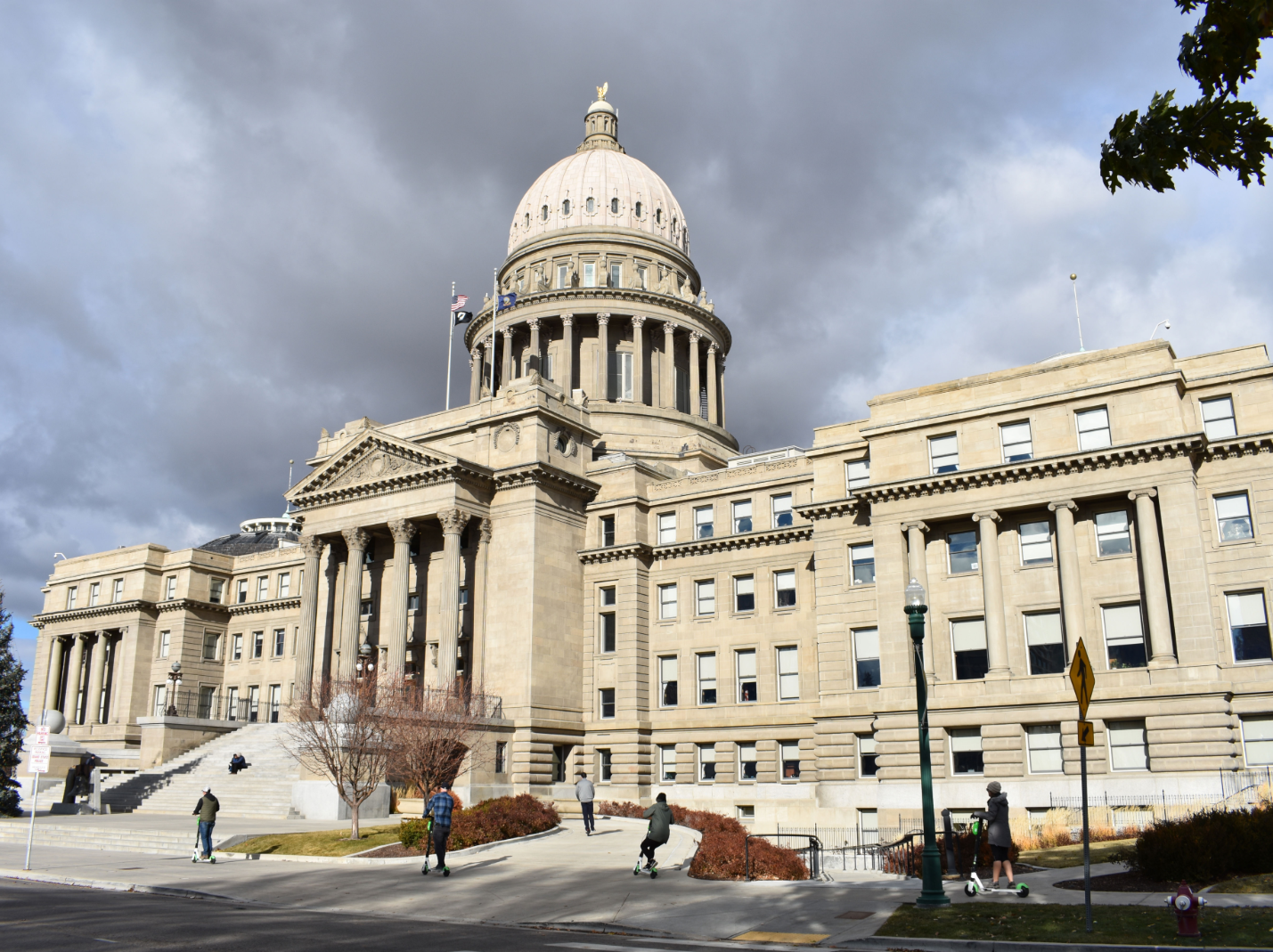
Idaho’s House Bill 264, Protecting the Privacy of Women, was signed into law in April. The legislation requires “covered entities”—including correctional facilities, domestic violence shelters, and state educational institutions—to designate restrooms, changing areas, and dormitories exclusively for either males or females. Access to these spaces is restricted based on a person’s biological sex. Two transgender individuals filed a lawsuit in July challenging the law on the grounds that it restricts access to gender-specific campus facilities, particularly restrooms.
Plaintiff Atlas Jones, a 19-year-old rising college sophomore at Boise State University (BSU), identifies as a man but was born female. She transitioned several years ago and has undergone medical treatment to align her appearance with her gender identity. Since her freshman year, Atlas has used restrooms consistent with her gender identity—that is, she used the men’s restrooms on campus. Plaintiff Sophie Smith identifies as female but was born male. He has been using women’s restrooms at the University of Idaho (U of I) for years, according to the lawsuit.
Each argues that HB 264 would effectively force them to disclose their transgender status on campus, as there are only a limited number of gender-neutral restrooms available for use. “H.B. 264, if it remains in effect at the beginning of the 2025-2026 school year, will prohibit BSU and U of I from allowing Plaintiffs to continue using restrooms that align with their gender identities and how they are perceived on campus,” the lawsuit says.
The lawsuit argues that HB 264 infringes on the plaintiffs’ rights to equal protection and privacy under the 14th Amendment, violates federal workplace protections, and breaches Title IX—which, despite attempts by the Biden administration to expand its scope, does not include gender identity as a protected class.
HB 264’s sponsor, Rep. Barbara Ehardt, R–Idaho Falls, responded to the lawsuit on social media, expressing confidence that it will fail. She pointed to Idaho’s existing legislation for K–12 schools, enacted in 2023, which also prohibits transgender students from using bathrooms that align with their gender identity. In a Facebook post, Ehardt noted that the federal 9th Circuit Court of Appeals recently upheld the K–12 law, suggesting a strong precedent in favor of HB 264.
Idaho’s passage of HB 264 comes at a time when the Trump administration is actively enforcing a Title IX policy that rightly recognizes only two genders. Earlier this year, President Trump issued Executive Order 14168, Defending Women From Gender Ideology Extremism and Restoring Biological Truth to the Federal Government. The Department of Education followed with a “Dear Colleague” letter, announcing that it would enforce Title IX under the 2020 rule. Under this policy, schools must recognize only male and female students—or risk losing federal funding. HB 264 aligns with this federal guidance by requiring K–12 schools to designate separate bathrooms for boys and girls, reinforcing the administration’s two-gender framework.
The BSU student, described as appearing and sounding male, is considered—her lawyers argue—“at risk for harassment and violence” if she is forced to use the women’s bathroom. Presumably, she is suggesting that, because she looks like a man, she should be allowed to use the men’s restroom. Yet this reasoning creates the very kind of confusion HB 264 seeks to prevent: female students encountering someone who appears male—even if that person is biologically female—cannot easily discern who belongs in the space, leading to discomfort and uncertainty. This mirrors my own experience at Emory, where a biological man—who identified as a woman but physically presented as male—was in the women’s restroom at the same time I was. At the time, the school permitted individuals to use restrooms consistent with their gender identity, and it made me feel distinctly uncomfortable.
HB 264 is important because it mandates that individuals use facilities, including bathrooms, based on their biological sex, not gender identity. By establishing this clear boundary, the law preserves the privacy and comfort of female students while eliminating the uncertainty caused by differing appearances.
Moreover, past incidents on campuses further prove the need for biologically based laws.
In April, I reported that Brooke Slusser, a student at San Jose State University (SJSU), was part of a lawsuit against SJSU and the Mountain West Conference filed in November 2024. Slusser and 11 other plaintiffs alleged that coaches and administrators withheld the true sex of their transgender teammate, Blaire Fleming, even as they shared intimate spaces like locker rooms and hotel rooms. Slusser later said that discovering Fleming’s biological sex left her feeling blindsided and uncomfortable.
By designating restrooms and other facilities based on biological sex, the Idaho law provides clarity and preserves the privacy of women’s spaces.
[RELATED: UK Supreme Court Answers, ‘What Is a Woman?’—Colleges Should Pay Attention]
Good, then, that the courts seem to be siding with HB 264.
Alongside the lawsuit, Jones and Smith sought a preliminary injunction to block enforcement of H.B. 264 while their case proceeded. The district court denied the motion, finding that the law is substantially related to protecting privacy in sex-specific spaces and noting that alternative accommodations were available. A subsequent motion for an injunction pending appeal was also denied, as no new legal arguments or evidence justified departing from the court’s prior analysis.
As of today, the lawsuit remains ongoing in the U.S. District Court for the District of Idaho. All indications suggest it is unlikely to succeed, leaving HB 264’s protections for women’s spaces intact.
Image: “Idaho State Capitol Building” by Tamanoeconomico on Wikimedia Commons

“Presumably, she is suggesting that, because she looks like a man, she should be allowed to use the men’s restroom. Yet this reasoning creates the very kind of confusion HB 264 seeks to prevent: female students encountering someone who appears male—even if that person is biologically female—cannot easily discern who belongs in the space, leading to discomfort and uncertainty.”
Actually that reasoning sounds quite sound: If the plaintiff looks like a man, then forcing him/her to use the women’s facilities will naturally make women uncomfortable. The reasoning doesn’t create the confusion; the facts do. There is no easy answer to this, including passing a law requiring an easy answer. The underlying problem is that for most of a century we have developed an ethos of nondiscrimination in this country while simultaneously maintaining sex-segregation in certain facilities, without resolving the contradiction. This was a clash waiting to happen. Something would eventually have triggered it, if not transsexuals.
Resolving this contradiction is not easy, and sneering at adversaries does not quite achieve it. Racial discrimination provides an inexact but illuminating parallel. We trumpet the principle that treating people differently because of their race is wrong, and everyone is equal. Yet tribalism based on appearance is a deeply-ingrained part of human psychology, and completely exterminating it would require a totalitarian state. So there are still clashes. How do we tell people to be proud of their heritage without crossing some invisible line into racial chauvinism? How do we tell people that race doesn’t matter without telling them that THEIR race doesn’t matter, negating an important part of themselves? Is a scholarship for black students OK? Is it legal but scandalous? We haven’t resolved these yet.
Any definition of sex will create some injustices. If the plaintiffs look like their preferred sexes, then using restrooms corresponding to their original sexes will leave others uncomfortable. The plaintiffs’ own comfort should not be ignored; they are people too. Specifying “biological” sex in the statute will leave ambiguity if plaintiffs have certain surgical procedures. Sex is an area where human nature sometimes clashes with principles of equality, and the best resolutions will involve compromises, legislative or otherwise, which violate absolute principles.